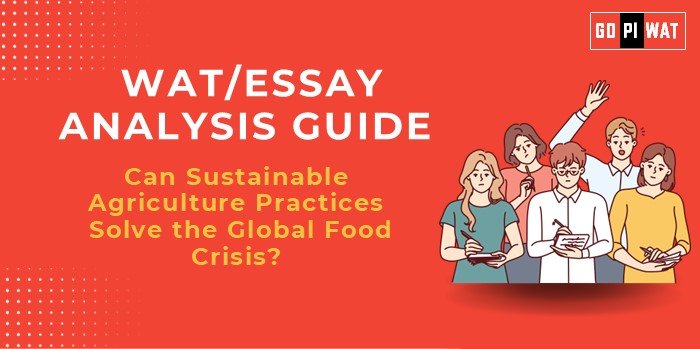📋 Written Ability Test (WAT)/Essay Analysis Guide: Can Sustainable Agriculture Practices Solve the Global Food Crisis?
🌍 Understanding the Topic’s Importance
The global food crisis demands urgent solutions that balance productivity with sustainability. This topic aligns with critical themes like resource management, climate action, and social equity—core aspects of business and policy education.
🕒 Effective Planning and Writing
- Time Allocation:
- Planning: 5 minutes
- Writing: 20 minutes
- Review: 5 minutes
- Preparation Tips: Note relevant statistics and examples. Frame counterpoints and their resolutions.
✍️ Introduction Techniques for Essays
- Contrast Approach: “While agriculture is the backbone of global economies, its unsustainable practices threaten food security. Can sustainability ensure resilience?”
- Timeline Approach: “From traditional farming methods to advanced sustainable technologies, agriculture’s evolution offers hope amid the food crisis.”
📖 Structuring the Essay Body
- Paragraph 1: Achievements
Highlight successes in regions implementing sustainable methods, such as Sikkim’s organic transformation.
- Paragraph 2: Challenges with Comparative Analysis
Discuss barriers like cost and scalability while comparing with international examples like the Netherlands.
- Paragraph 3: Future Outlook
Explore potential solutions, such as policy interventions and technological innovations.
📄 Concluding Effectively
- Balanced Perspective: “Sustainable agriculture bridges the gap between ecological conservation and food security, but collaborative efforts are key to its global success.”
- Global Example Comparison: “The success of sustainable practices in countries like Rwanda and the Netherlands exemplifies the potential for a global solution to the food crisis.”
📊 Analyzing Successes and Shortcomings
- Achievements: Improved yields, reduced resource usage.
- Challenges: High costs, knowledge gaps.
- Global Context: Leading examples from the Netherlands and Rwanda.
💡 Recommendations for Sustainable Progress
- Enhance public-private partnerships for funding and education.
- Promote global knowledge-sharing initiatives.
- Invest in scalable technologies like vertical farming.
📝 Sample Short Essays
Balanced Perspective:
“While sustainable agriculture holds promise, its widespread adoption faces economic and logistical barriers. Addressing these challenges requires a multi-stakeholder approach involving governments, farmers, and technology leaders.”
Solution-Oriented:
“Promoting sustainable farming through incentives, education, and innovation can tackle hunger and environmental challenges simultaneously.”
Global Comparison:
“Learning from nations like the Netherlands, which combines technology with sustainable practices, can guide global efforts to ensure food security.”


